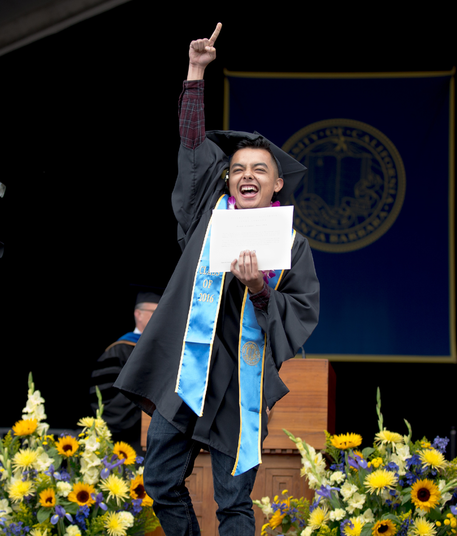|
Being the first to go to college brings with it a tremendous sense of pride. You and your family have invested a lot of energy and resources to get you here so that you can pave the road to a better future. This opportunity brings with it great excitement about the possibilities that can open up ahead for you.
For many 1st gen students it also means that you carry the dreams of your family and your community with you. That can feel like a lot of pressure! For some 1st generation students, pressure to succeed and make your family and your community proud may lead to increased stress and fear of failure, and in turn this will negatively impact your health and your ability to meet your academic goals. Check out these tips about how to handle this pressure:
|
- Talk to your family and important others about what is really going on. Some 1st generation students hesitate to tell their families, community supports, or past mentors about the challenges they are facing. They fear that admitting to struggling will disappoint others. Remember, those folks helped you through past challenges so that you could get here. They want to see you succeed. No one succeeds without support. Let them continue to be your sounding board to solve problems and be your cheerleader to encourage you when you feel discouraged.
|
|
|
|
Watch our video that our Mental Health Peers made to meet some of the first generation faculty here at UCSB and here their advice looking back at their university experience!
|
UC Santa Barbara First Generation FacultyOver 40% of UCSB students will be the first in their family to graduate from a four year college. A significant fraction of our faculty were also once first generation students.
|
Overcoming Guilt as a First-Gen
Being a first generation student can come with different challenges during their college experience. One is overcoming the feeling of guilt that comes up for students when taking the opportunities offered at these prestigious institutions and leaving their families. Read more below to learn about the experience shared by a UCSB student.
Being a first generation student can come with different challenges during their college experience. One is overcoming the feeling of guilt that comes up for students when taking the opportunities offered at these prestigious institutions and leaving their families. Read more below to learn about the experience shared by a UCSB student.
"I came across many emotions about leaving home to attend college. I felt excited to be taking the next step in my education and closer to helping my family one day. However, it did not take long to start feeling guilty for not being able to help financially or emotionally right after graduating high school. Not knowing how to deal with this feeling of guilt I found myself putting my family’s needs before mine. I would find different ways to support my family from afar even if it meant putting myself second. I started to realize how my mental health was being affected by the pressure I felt of making it up to my family for ‘leaving’.
Leaving for college made me feel like I was abandoning my family and leaving my financial responsibilities behind. I felt like I was leaving my community behind, the one who had supported me unconditionally. It took me some time but I was able to ground myself by remembering my end goal of attending college. I was not leaving for college to escape or abandoned anyone. I reminded myself that I was doing this to further my education so that one day I can return to my community with the ability to give back and make a difference. The more I communicated with my family the more reassurance I felt about still having the same support from my family but most importantly their understanding for me leaving for college." - UCSB alum class of '22
Leaving for college made me feel like I was abandoning my family and leaving my financial responsibilities behind. I felt like I was leaving my community behind, the one who had supported me unconditionally. It took me some time but I was able to ground myself by remembering my end goal of attending college. I was not leaving for college to escape or abandoned anyone. I reminded myself that I was doing this to further my education so that one day I can return to my community with the ability to give back and make a difference. The more I communicated with my family the more reassurance I felt about still having the same support from my family but most importantly their understanding for me leaving for college." - UCSB alum class of '22
Check out the articles below to read more about the guilt that first-generation students experience and how to cope with it:
Proudly powered by Weebly

